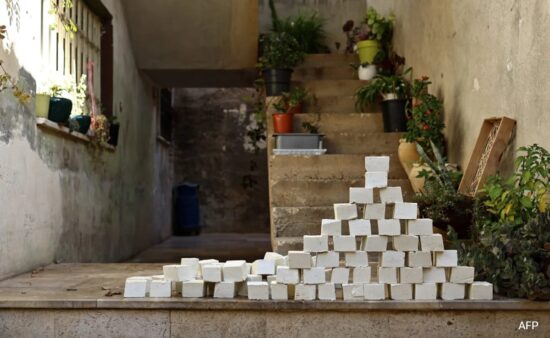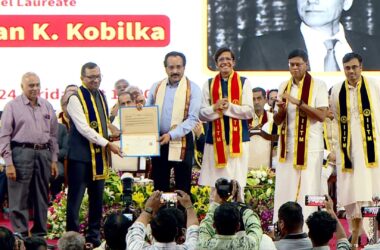
Salem:
Initiated into the thousand-year-old follow of Nablus cleaning soap making by a distant relative, Umm al-Abed is now passing on the secrets and techniques of the follow newly designated by UNESCO as intangible world heritage.
Umm al-Abed handcrafts cleaning soap at her house within the village of Salem, east of Nablus, in certainly one of many small cleaning soap workshops throughout the Israeli-occupied West Financial institution.
The method is rudimentary, involving a plastic bucket in a concrete courtyard and simply three elements: olive oil, water and lye.
“The one who taught us to make the cleaning soap was an aged relative from the village of Immatin. A very long time in the past, round 20 to 30 years, she got here right here and made cleaning soap,” Umm al-Abed stated.
“When she cooked the oil, I watched how she did it. I learnt the processes and I started to make cleaning soap myself. I made it for all of the residents” of the village, she stated.
Behind Umm al-Abed, the ladies have been exhausting at work. One poured olive oil from a container, then added the lye. Utilizing an extended stick, she stirred the combination with one hand and poured in water with the opposite. As she did so, the combination progressively turned vibrant inexperienced.
The cooking is finished in an oil drum over a wooden hearth. When the combination is prepared, it’s poured into massive, plastic-lined trays and left to chill and harden.
The large block is then marked by hand earlier than being lower into small bars of cleaning soap with a large steel sheet.
The artisanal course of, handed down from era to era, was not too long ago added to UNESCO’s record of intangible cultural heritage.
‘Must protect it’
It joins different Palestinian entries like hikaye, a practice of feminine storytelling, the standard dabkeh dance and embroidery.
In line with the UN’s cultural organisation: “The usage of olive oil displays individuals’s sturdy relation to nature, and many individuals use their home made cleaning soap as a private reward for celebrations equivalent to weddings and birthdays.”
“Most households in Palestine share the custom, with each women and men participating” in all levels of manufacturing and youngsters serving to to chop and pack it.
In Nablus, the Tuqan cleaning soap manufacturing unit, established in 1872, continues to churn out bars.
It was based “within the Ottoman interval and has made cleaning soap ever since”, stated Nael Qubbaj, the manufacturing unit chief.
He sat in his workplace, surrounded by light portraits of swimsuit and fez-wearing males, all members of the Abdul Fattah Tuqan household, co-founders of the manufacturing unit.
The location’s output is significantly greater than that of Umm al-Abed’s artisanal workshop.
On the manufacturing unit flooring, a layer of cleaning soap lined the entire room from wall to wall. A barefoot cleaning soap maker slowly walked backwards throughout the room slicing the huge cleaning soap carpet into completely sized particular person blocks.
The hundreds of particular person soaps have been then stacked into hole spherical towers to dry earlier than being individually wrapped.
Recognition by UNESCO of Nablus cleaning soap “is an acknowledgement by the worldwide group… of the importance of this craft and the necessity to protect it,” stated Qubbaj.
Doing so was particularly necessary “given the Israeli occupation’s efforts to undermine these conventional industries,” he stated.
(Apart from the headline, this story has not been edited by NDTV employees and is revealed from a syndicated feed.)








